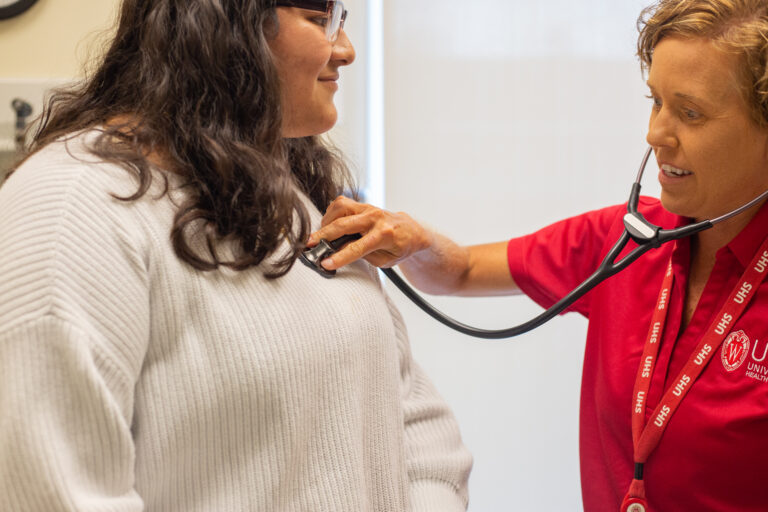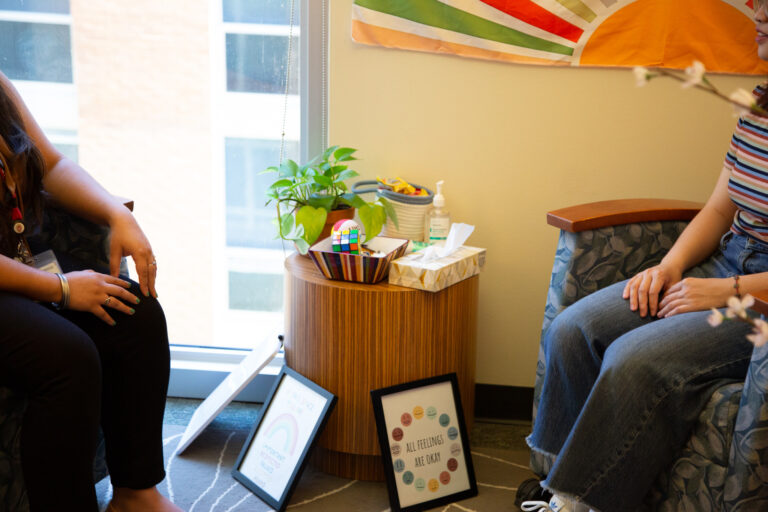The transition to college is an important time for students and their loved ones. University Health Services takes the health and safety of your student seriously.
Incoming Fall 2025 students are eligible to begin using UHS starting August 15. Access to MyUHS (for accessing health forms and online appointment scheduling) begins in mid-July.
Learn more about the scope of our care as we prepare to welcome your student to campus.
Mental Health Services
UHS Mental Health Services provides flexible, short-term mental health care in supportive and responsive ways to meet students’ individual needs. Like most of our services, mental health care is no-cost to students. UHS offers counseling as well as psychiatry, survivor support, and assessments for specialized concerns.
Medical Services
UHS Medical Services treats many common health concerns like sore throats, colds, upset stomachs, and pink eye. Our clinicians also provide a wide range of preventative care. Students can access sexual health care including STI testing, nutrition services, pre-travel consultations, and much more!
Prevention Services
UHS engages all students in online training opportunities to learn more about their role in preventing sexual violence, alcohol and drug misuse, and suicide. Prevention and Campus Health Initiatives does this through community-specific trainings and workshops, presentations on campus-level health data, and Badger Recovery, a UW-Madison recovery community.
Frequently Asked Questions
This is an accordion element with a series of buttons that open and close related content panels.
How does a student make an appointment?
Incoming Fall 2025 students are eligible to begin using UHS services after August 15. Access to MyUHS (online appointment scheduling) begins in mid-July.
Medical Services
Students can make medical appointments online (via MyUHS) or by calling 608-265-5600 (option 1). Many same-day appointments are available.
There are two clinics on campus. The main clinic is located on East Campus Mall near the Southeast Residence Halls. The Lakeshore Clinic is located in Dejope Hall. Both clinics are open to all students.
Mental Health Services
For clinical mental health services, every new client starts with a phone screening (called an Access Appointment) to collaboratively determine your needs and connect you to the best resources. There is no charge for this appointment. To schedule an Access Appointment, call 608-265-5600 (option 2) or log on to MyUHS for 24/7 online scheduling.
Is there a cost to use UHS services?
For most services at UHS there is no cost because students pay for UHS services with their segregated fees. For all of the things your student would see a provider for at home, there is no cost for those same appointments at UHS.
There are costs associated with some immunizations and specialty services like travel forms or physical exams for some employers.
How does a student fill prescriptions or transfer medications?
Fill a new prescription
UHS does not have a pharmacy on site but there are three pharmacies within walking distance of campus (including a Walgreens in the same building as UHS). If a student is prescribed a medication, they are responsible for picking up that prescription and any cost associated with the prescription. Students are advised to bring their prescription benefit card to campus with them.
Transfer medication
Students should come with an adequate supply of medication until they are able to establish care with a UHS provider, should they choose to transfer their prescription.
Students who are interested in transferring their psychiatric medication management to UHS should refer to the UHS Psychiatry page for information on the referral process. After reviewing this information, the next step is to schedule an Access Appointment. This appointment is the entry point to accessing Mental Health Services at UHS.
Can a student have an advanced directive on file?
UHS medical and mental health records are protected by federal law. UHS does not disclose information to parents or guardians for students over the age of 18 without the student’s consent. Students have the right to receive information about and assistance with advance directives and designating someone (known as a health care power of attorney) to make health care decisions for them in the event that they are unable. Being a Designated Agent for Advance Directives or Health Care Power of Attorney does not automatically allow access to the medical records.
Can parents/family members access a student's UHS health records?
If your student is 18 years or older, their health records are protected by federal and state health privacy laws. We can’t talk to parents and family members about a student’s health without their permission. Being your student’s Health Care Power of Attorney does not automatically allow for access to their health records.
Students who are under the age of 18 as of August 15 must have a parent or legal guardian sign a consent form to be eligible to receive all UHS services. Both the parent/legal guardian and student must sign the consent form. If completing consent form BEFORE mid-July, bring the signed form to the 5th Floor Information Desk at UHS (333 East Campus Mall). If completing consent form AFTER mid-July, students should use these instructions to upload the form to MyUHS.
Without a signed minor consent form, many UHS medical services cannot be provided. STI testing, pregnancy testing, and sexual assault-related services are available to minors without parent/legal guardian consent.
Students can complete an Release of Information AFTER they establish care at UHS. We’re often asked if the student can sign a “blanket” release of information form and the answer is no. In health care matters, advance releases are not legally defensible and can be revoked by the student at any time.
With a student’s permission, UHS clinicians speak with parents regularly and appreciate parental involvement when appropriate. UHS clinicians encourage students to allow them to contact their family members when a student experiences a significant illness or injury. However, if the student declines, the clinician, legally, must respect the student’s decision.
UHS Health Information Management
333 East Campus Mall, 8th floor
Phone: 608-262-1676
Fax: 608-262-9160
Do students need health insurance?
All enrolled students are eligible for the medical and counseling care available at University Health Services, but UHS is not a substitute for health insurance. UHS is not open evenings and weekends and does not provide Emergency Room care, hospitalization, or specialty care for complex problems. We recommend that students review their insurance coverage before coming to campus.
The voluntary UW-Madison Student Health Insurance Plan (SHIP) is a good option for students without adequate insurance coverage. SHIP members utilize UHS for primary and preventive care and are also protected by a nationwide network of hospitals, clinics, and specialized medical services.
SHIP is part of UHS but neither SHIP nor UHS are affiliated with UW Health. UW Health is a separate health care organization.
How do I talk about health with my student?
Conversations about health can be difficult, especially around issues like alcohol use, sexual violence, and mental health and suicide. UHS created a guide to help facilitate conversations around these common health concerns that can sometimes be associated with college culture more broadly.
Common Medical and Mental Health Questions
This is an accordion element with a series of buttons that open and close related content panels.
How does a student start mental health services at UHS?
An Access Appointment is the first step to Mental Health Services and is typically done over the phone.
During the Access Appointment, students will have a discussion with an access specialist who will listen, ask questions about a student’s symptoms, experiences, and resources, and connect them with the services they need, both on and off campus. Students will be able to make requests to be referred to mental health providers with specific identities, backgrounds, or training for their ongoing care here at UHS or in the community.
There is no cost for this appointment.
How long is the wait for individual counseling?
Wait time vary depending on the time of year. Mental Health Services sees an increase in requests for appointments during traditionally stressful times of year such as finals.
Students have access to counselors every day on campus through drop-in opportunities. These are shorter, informal, one-on-one sessions. No appointment is required and there is availability every day of the week.
We also have a crisis phone line that is available 24/7. No concern is too small to call. We encourage to reach out before an issue becomes too much for the student to handle themselves.
Are there session limits for mental health services?
Students should call UHS Mental Health Services to make an appointment and communicate the level of urgency of their needs.
UHS offers a range of mental health services, including short-term counseling. Length of care varies depending on student needs. Counselors work with each of their clients to develop a care plan. Students typically work with a counselor for a semester or less, and they may return throughout their time at UW-Madison.
For students who want more care, they can also participate in other mental health services such as group counseling.
For students who need longer-term, ongoing care, we set up an appointment with a UHS care manager to help students explore community options.
This is an accordion element with a series of buttons that open and close related content panels.
Are there any required immunizations?
At this time, UW-Madison does not have a vaccine requirement for students. These vaccines are recommended for all incoming college students:
- COVID-19
- Hepatitis B (HBV)
- Human Papilloma Virus (HPV)
- Measles-Mumps-Rubella (MMR)
- Meningococcal Vaccine (MCV4)
- Tetanus-Diphtheria-Pertussis (Tdap or DTP)
- Varicella (VZV, chicken pox)
Maintain written records of all the immunizations you received. Documentation of immunizations is often needed for some academic programs, employment, or foreign travel.
Read the FAQ about meningococcal disease and hepatitis B. If you live in University Housing, Wisconsin state law requires you to inform the university whether you have been vaccinated against hepatitis B and meningococcal disease. Comply with this requirement by completing the relevant sections of your immunization and health history forms in your MyUHS account. If you do not complete the online form to provide this information, you may be in violation of your housing contract.
Does UHS offer nutrition counseling or support for eating concerns?
UHS Registered Dietitians are here to help you find eating strategies that work for you. We frequently meet with students to help with general nutrition questions, food intolerances, health concerns (like high cholesterol or PCOS) and disordered eating concerns.
UHS Registered Dietitians to help students find eating strategies that work for then. We frequently meet with students to help with general nutrition questions, food intolerances, health concerns (like high cholesterol or PCOS) and disordered eating concerns.
We also offer an eating disorder assessment through Mental Health Services and an eating concerns support group.
Does UHS offer birth control and STI testing?
The Sexual Health and Gynecology Clinics provide individualized care.
Common Sexual Health Clinic visits include urethral discharge, vaginal discharge, genital wart evaluation/treatment, and HIV prevention, including PEP and PrEP.
Concerns such as contraceptive care, pregnancy screening, evaluation of erectile dysfunction, routine gynecological care, or other primary care concerns may be addressed in the Gynecology Health Clinic or the Primary Care Clinic.
STI testing and HIV testing are confidential and do not require parental consent if students are under the age of 18.
The cost of any medication prescribed is not included, but we can help find resources for coverage.


